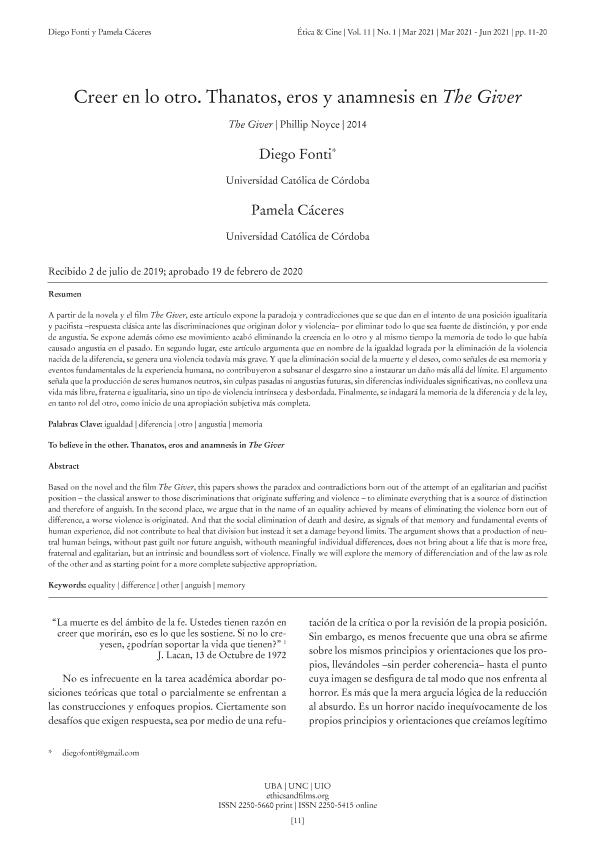Artículo
A partir de la novela y el film The Giver, este artículo expone la paradoja y contradicciones que se que dan en el intento de una posición igualitaria y pacifista –respuesta clásica ante las discriminaciones que originan dolor y violencia– por eliminar todo lo que sea fuente de distinción, y por ende de angustia. Se expone además cómo ese movimiento acabó eliminando la creencia en lo otro y al mismo tiempo la memoria de todo lo que había causado angustia en el pasado. En segundo lugar, este artículo argumenta que en nombre de la igualdad lograda por la eliminación de la violencia nacida de la diferencia, se genera una violencia todavía más grave. Y que la eliminación social de la muerte y el deseo, como señales de esa memoria y eventos fundamentales de la experiencia humana, no contribuyeron a subsanar el desgarro sino a instaurar un daño más allá del límite. El argumento señala que la producción de seres humanos neutros, sin culpas pasadas ni angustias futuras, sin diferencias individuales significativas, no conlleva una vida más libre, fraterna e igualitaria, sino un tipo de violencia intrínseca y desbordada. Finalmente, se indagará la memoria de la diferencia y de la ley, en tanto rol del otro, como inicio de una apropiación subjetiva más completa. Based on the novel and the film The Giver, this papers shows the paradox and contradictions born out of the attempt of an egalitarian and pacifist position – the classical answer to those discriminations that originate suffering and violence – to eliminate everything that is a source of distinction and therefore of anguish. In the second place, we argue that in the name of an equality achieved by means of eliminating the violence born out of difference, a worse violence is originated. And that the social elimination of death and desire, as signals of that memory and fundamental events of human experience, did not contribute to heal that division but instead it set a damage beyond limits. The argument shows that a production of neutral human beings, without past guilt nor future anguish, withouth meaningful individual differences, does not bring about a life that is more free, fraternal and egalitarian, but an intrinsic and boundless sort of violence. Finally we will explore the memory of differenciation and of the law as role of the other and as starting point for a more complete subjective appropriation.
Creer en lo otro: Thanatos, eros y anamnesis en The Giver
Título:
To believe in the other: Thanatos, eros and anamnesis in The Giver
Fecha de publicación:
06/2021
Editorial:
Centro de Investigaciones y Estudios sobre Cultura y Sociedad. Programa de Estudios Psicoanalíticos. Ética, Discurso y Subjetividad
Revista:
Ética & Cine
ISSN:
2250-5660
e-ISSN:
1853-6247
Idioma:
Español
Tipo de recurso:
Artículo publicado
Clasificación temática:
Resumen
Palabras clave:
ALTERIDAD
,
MEMORIA
,
EROS
,
THANATOS
,
ANGUSTIA
Archivos asociados
Licencia
Identificadores
Colecciones
Articulos(CCT - CORDOBA)
Articulos de CTRO.CIENTIFICO TECNOL.CONICET - CORDOBA
Articulos de CTRO.CIENTIFICO TECNOL.CONICET - CORDOBA
Citación
Fonti, Diego Osvaldo; Caceres, Pamela; Creer en lo otro: Thanatos, eros y anamnesis en The Giver; Centro de Investigaciones y Estudios sobre Cultura y Sociedad. Programa de Estudios Psicoanalíticos. Ética, Discurso y Subjetividad; Ética & Cine; 11; 1; 6-2021; 11-20
Compartir




